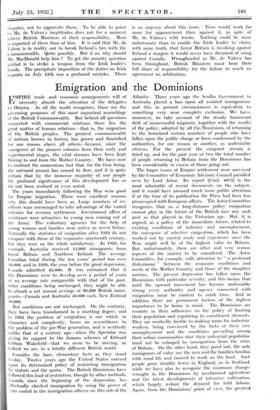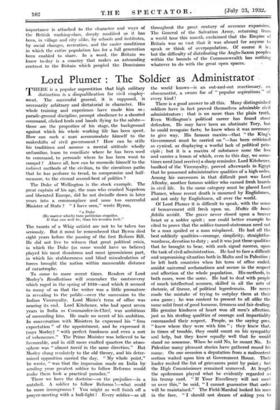Emigration and the Dominions
"UMPIRE trade and economic arrangements will of ./CA necessity absorb the attention of the delegates to Ottawa. As all the world recognizes, those are the governing purposes of this most important assemblage of the British Commonwealth. But behind all questions connected with commercial relations there lies the great matter of human relations—that is, the migration of the British peoples. The greatest commonwealth of nations known to history has grown and flourished for one reason above all others—because, since the emergence of the pioneer colonies from their early and experimental stages, the vital streams have been kept flowing to and from the Mother Country. We have now to confront the momentous fact that, for the time being, the outward stream has ceased to flow, and it is quite certain that by the immense majority of our people the profound significance of this development has so far not been realized or even noted.
The years immediately following the War were good for Empire migration. There were excellent reasons why this should have been so. Large numbers of ex- officers were encouraged to take advantage of the varied schemes for oversea settlement. Government offers of assistance were attractive to young men coming out of the Army. The voluntary agencies for the help of young women and families were active as never before. Naturally the statistics of emigration after 1919 do not compare with those of the expansive nineteenth century, but they were on the whole satisfactory. In 1926, for example, Australia received 41,000 immigrants from Great Britain and Northern Ireland. The average Canadian total during the ten years' period was over 40,000, and in 1929, the year before the great depression, Canada admitted 65,000. It was estimated that if the Dominions were to develop over a period of years at an average rate comparable with that of the past, other conditions being unchanged, they might be able to absorb a net annual average of 90,000 British immi- grants—Canada and Australia 40,000 each, New Zealand 10.000.
But conditions are not unchanged. On the contrary, they have been transformed in a startling degree, and in 1932 the problem of emigration is one which, in character and complexity, bears no resemblance to the problem of the pre-War generation, and is so utterly unlike that of a century ago—when the Spectator was giving its support to the famous schemes of Edward Gibbon Wakefield—that we seem to be moving, as indeed we are, in a totally different British world.
Consider the bare, elementary facts as they stand to-day. Twelve years ago the United States entered upon its determined policy of restricting immigration by statute and the quota. The British Dominions have followed this lead of restriction, though by other methods. Canada, since the beginning of the depression, has rffectually checked immigration by using the power of 'Jet° vested in the immigration officers on this side of the Atlantic. Three years ago the Scullin Government in Australia placed a ban upon all assisted immigration, and this in present circumstances is equivalent to something very near complete exclusion. We have, moreover, to take account of the steady homeward drift of unsuccessful migrants, .together with the results of the policy, adopted by all :tlie,alburinions, of returning to the homeland certain numbers f- people who have fallen upon the public charge or been condemned by the authorities, for one reason or another, as undesirable *citizens. For the present the emigrant stream is dried up, and for the past year or two the total number of people returning to Britain from the Dominions has been considerably in excess of those going out.
The larger issues of Empire settlement were surveyed by the Committee of Economic Advisory Council presided over by Lord Astor. Its report (Cmd. 4075) is the most admirable of recent documents on the subject, and it would have aroused much more public attention if at the time of its publication the Press had been less preoccupied with European affairs. The Astor Committee recognizes that as a long-distance policy emigration cannot play in the future of the British race any such part as that played in the Victorian age. But, it is argued, as a policy of the immediate future, related to existing conditions of industry and unemployment, the enterprise of selective emigration, which has been worked out by careful study and experience since the War, might well be of the highest value to Britain. But, unfortunately, there are other and very serious aspects of the matter to be considered. The Astor Committee, for example, calls attention to " a profound disharmony " between the economic conditions and needs of the Mother Country and those of the daughter nations. The present depression has fallen upon the Dominions with particular severity, and this means that until the upward movement has become undeniably strong every authority and agency connected with emigration must be content to mark time. And in addition there are permanent factors of the highest importance to be borne in mind. The Dominions are resolute in their adherence to the policy of limiting their population and regulating its constituent elements. They are markedly hostile to making room for industri& workers, being convinced by the facts of their own unemployment and the conditions prevailing among their urban comniunities that their industrial population must not be enlarged by immigration from the cities of Britain. On the other hand, they point out, the only immigrants of value are the men and the families familiar with rural life and trained to work on the land. Such people grow steadily fewer in England, as in Scotland, while we have also to recognize the enormous changes wrought in the Dominions by mechanized agriculture and the latest developments of intensive cultivation, which largely reduce the demand for field labour. Again, from the Dominions' point of view, the greatest importance is attached to the character and ways of the British working-class, deeply modified as it has been, in village and city alike, by schools and institutes, by social changes, recreation, and the easier conditions in which the entire population has for a full generation been enabled to share. In a word, the Britain we know to-day is a country that makes an astounding contrast to the Britain which peopled the Dominions throughout the great century of overseas expansion. The General of the Salvation Army, returning- from a world. tour this month, exclaimed that the Empire of Britain was so vast that it was absurd for anyone to speak or think of overpopulation. Of course it Is; but the difficulty of distributing the Anglo-Saxon peoples within the bounds of the Commonwealth has -nothing whatever to do with the great open spaces. •















































 Previous page
Previous page